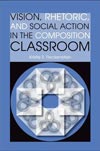 Kristie Fleckenstein's new publication—Vision, Rhetoric, and Social Action in the Composition Classroom (Southern Illinois UP, 2009)—might sound a bit academic, even impersonal, to the layperson, but her purpose is quite the opposite: "to help students connect to their surroundings with an empathic eye, leading them to become compassionate participants, not indifferent observers." Vision, Rhetoric, and Social Action is premised, she says, on the idea that changing the world "requires changing the way we see the world."
Kristie Fleckenstein's new publication—Vision, Rhetoric, and Social Action in the Composition Classroom (Southern Illinois UP, 2009)—might sound a bit academic, even impersonal, to the layperson, but her purpose is quite the opposite: "to help students connect to their surroundings with an empathic eye, leading them to become compassionate participants, not indifferent observers." Vision, Rhetoric, and Social Action is premised, she says, on the idea that changing the world "requires changing the way we see the world."
The way we see, according to Fleckenstein, is critical to adopting a more empathic stance. Fleckenstein says: "In the West, we are predominantly trained to detach ourselves from what we see: to know something, we analyze it; we don't identify with it." But, in Fleckenstein's view, a goal in a writing classroom is not only the division of analysis but the identification with others provided by rhetoric. "By seeing empathically, we have the potential of devising strategies for social action that invite change through identification, not through division."
In her view, faculty have a responsibility to foster a way of seeing and a way of writing that privilege identification with others rather than detachment from them. At the same time, Fleckenstein expects her students to show up for her classes with enthusiasm and commitment. "While I work to meet them where they are in their learning—to take into account and respect the strengths they bring with them into the classroom, regardless of how diverse—I want them to strive to meet me in my learning," Fleckenstein says. "I ask them to engage with the material, with each other, and with me in ways that ensure we all walk out of every class richer for the interaction."
 Vision, Rhetoric, and Social Action, begun during the research and writing phases of her last publication, is in some ways a continuation of it. In 2003, Fleckenstein's Embodied Literacies: Imageword and a Poetics of Teaching (Southern Illinois UP), was released: it received the 2005 Best Book of the Year Award from the Conference on College Composition and Communication (CCCC), the flagship organization for faculty in rhetoric and composition. In writing Embodied Literacies, however, Fleckenstein had to exclude a number of ideas important to her, "bits and pieces" that provided the beginnings of Vision, Rhetoric, and Social Action.
Vision, Rhetoric, and Social Action, begun during the research and writing phases of her last publication, is in some ways a continuation of it. In 2003, Fleckenstein's Embodied Literacies: Imageword and a Poetics of Teaching (Southern Illinois UP), was released: it received the 2005 Best Book of the Year Award from the Conference on College Composition and Communication (CCCC), the flagship organization for faculty in rhetoric and composition. In writing Embodied Literacies, however, Fleckenstein had to exclude a number of ideas important to her, "bits and pieces" that provided the beginnings of Vision, Rhetoric, and Social Action.
And Fleckenstein's next project, already underway, is in part an extension of Vision, Rhetoric, and Social Action in its attention to the visual. That next project, Picture Perfect, Word Perfect: Nineteenth-Century Photography and the Rise of a Modern Rhetoric, investigates the intersection of nineteenth-century photography and rhetoric, particularly as manifested in issues of race and gender. "Chapters in the book are organized according to the five rhetorical canons: invention, arrangement, style, memory, and delivery," she says. "In each chapter I analyze the ways in which the intersection of photography and rhetoric changed the nature of each rhetorical canon. The material I use to demonstrate these changes deals with race and gender. For instance, one chapter looks at the scientific use of the daguerreotype—the first form of photography popular in the United States—within the context of pro-slavery rhetoric based on the theory of polygenesis or the belief that the various human races emerged from different evolutionary paths, rather than a single source."
Juggling her research and writing with her classroom responsibilities is even more challenging now that Fleckenstein has taken on the Director of Undergraduate Studies position in the English Department. Yet she appreciates the opportunity to give back to the department, especially with this administrative role. "DUS is especially attractive to me because I love undergraduate education," she says, while admitting that she has to maintain a focus on the writing of Picture Perfect, Word Perfect as well. "I consider it my daily vitamin or a kind of chewy calcium tablet, designed to keep my scholarly bones in working condition," she says. "I try to do something with the project every day, whether it is reading, writing, or tracking down archival resources. Although administrative responsibilities do not allow for blocks of time where I can single-mindedly focus on the research, I am learning how to work on the fly, a little bit here, a little bit there."
